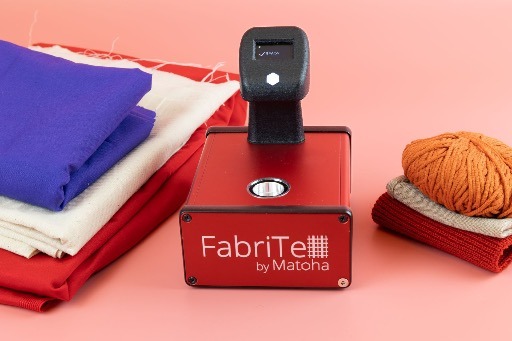Textile recycling is a critical component for a truly circular fashion industry, as textile waste reaches unsustainable levels across the globe, UK-based startup Matoha is turning the tide with a breakthrough in material identification technology. Using AI-powered scanners, Matoha is making it faster, easier, and more affordable to sort textiles by fibre type, solving a critical bottleneck in the recycling chain.
Each year, over 15 kilograms of textile waste is generated per person in Europe. Most of this comes from discarded clothes and home textiles, and only a tiny fraction is recycled back into fibres. The main challenge? Recycling plants require precise fibre separation, but identifying fabric types is notoriously complex, slow, and expensive. Matoha’s technology offers a game-changing solution.
Each year, over 15 kilograms of textile waste is generated per person in Europe.

Textile Recycling Core Challenge: Identifying Materials for Recycling
In order to recycle textiles, especially through fibre-to-fibre processes, materials must be accurately sorted by composition, cotton, polyester, wool, viscose, nylon, and blends each need distinct treatment. However, current methods for fibre identification are either lab-based, costly, or incompatible with high-speed sorting operations.
As a result, up to 60% of textile waste is either incinerated or sent to landfill. Even among the waste that is exported for reuse, a significant portion is ultimately discarded due to poor quality or low resale value.
Up to 60% of textile waste is either incinerated or sent to landfill.
Matoha’s Breakthrough: Instant, Accurate, and Portable Textile Scanners
Matoha has developed compact, AI-powered scanners that use advanced spectroscopy and machine learning to instantly detect the fibre content of textiles, with results in under a second. Making textile recycling easier and faster, at scale.
Their devices include:
- 🖐️ Handheld textile scanners: Portable, easy to use on-site or in warehouses, enabling small businesses and charities to rapidly assess donated or discarded clothing.
- 🖥️ Desktop industrial scanners: Integrated systems designed for use in larger sorting facilities, providing rapid, high-throughput fibre identification without slowing operations.
All of Matoha’s devices are:
- Manually operated – ideal for plug-and-play integration
- Intuitive – require minimal training
- Cost-effective – no need for expensive lab testing or complex infrastructure
- UK-manufactured – designed and built in-house by Matoha’s expert team
By augmenting human sorting capability, these scanners allow materials to be diverted to the correct recycling or reuse stream, maximising resource recovery and reducing contamination.

AI at the Core: Smarter Recycling at Scale
At the heart of Matoha’s solution is a powerful AI algorithm trained to distinguish subtle differences in textile compositions. The system improves over time, continuously learning from new data to enhance precision.
“Textile sorting today is a manual, error-prone process. Our goal is to make it smarter, faster, and scalable,” said Hans Chan, CTO and Co-founder of Matoha. “We’re enabling a future where every end-of-life garment is correctly sorted and kept in the value chain.”
Matoha’s technology is also proving valuable in other sectors dealing with mixed-material waste, such as automotive, upholstery, and industrial textiles.
Enabling the Next Phase of Innovation
Matoha’s progress is backed by a successful Seed funding round, led by Archipelago Ventures and the Circular Plastics Accelerator, with support from Conduit Connect, British Design Fund, Fashion for Good, and others. This funding is enabling, the continued development of Matoha’s AI models and hardware, the expansion of the handheld scanner’s capabilities and the move toward automated robotic sorting systems in the next phase of development.
“Our dream is that every end-of-life garment will pass through a Matoha system,” Chan added. “This investment allows us to make that dream scalable, with AI and automation at the heart of it.”
A second funding phase is expected to close in late 2025, focused on accelerating deployment of Matoha’s robotic solutions for wider industry adoption.
Unlocking the Circular Textiles Economy
Efficient textile sorting is the missing link in circular fashion. Without scalable, accurate material identification, recycling, reuse, and upcycling efforts stall. Matoha’s AI technology helps bridge this gap by:
- Reducing textile waste sent to landfill or incineration
- Boosting the viability of fibre-to-fibre recycling
- Supporting fashion and waste management businesses in meeting sustainability targets
Industry experts are calling the solution “transformative.” Justin Guest of Archipelago Ventures says it “unlocks textile sorting at scale,” while Claire Shrewsbury of WRAP describes Matoha’s scanners as “a cost-effective and essential step” toward closing the loop in fashion.
With textile waste at an all-time high, innovative tech like Matoha’s is essential for building a sustainable future. By combining speed, precision, and AI, Matoha’s material identification scanners are setting a new standard in smart recycling making circular fashion not just possible, but practical.




